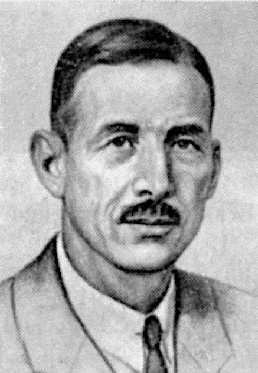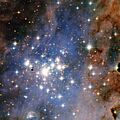Robert Julius Trumpler facts for kids
Robert Julius Trumpler (born October 2, 1886, in Zürich, Switzerland; died September 10, 1956, in Berkeley, United States) was an important Swiss-American astronomer. He is best known for his work on star clusters and for discovering how dust in space affects how we see stars.
Contents
Life and Work
Robert Trumpler first studied at the Universität Zürich before moving to the University of Göttingen in Germany. He earned his PhD there in 1910. In 1915, during World War I, he moved to the United States. He started working at the University of California and later at famous places like Allegheny Observatory and Lick Observatory. He became an American citizen in 1921. In 1932, he was chosen to be a member of the United States National Academy of Sciences, which is a big honor for scientists.
Discovering Space Dust
One of Trumpler's most important discoveries was about how light from distant stars changes. He noticed that faraway groups of stars, called open clusters, looked dimmer than expected. He also saw that these stars appeared redder than they should.
He figured out that tiny bits of interstellar dust scattered throughout our Milky Way galaxy were blocking some of the starlight. This effect, called interstellar extinction, makes distant objects look fainter and redder. His discovery helped astronomers understand the true brightness and distance of stars much better.
Studying Star Clusters
Trumpler spent a lot of time studying and listing open clusters. He used these clusters to try and figure out the size of our Milky Way galaxy. He first thought the Milky Way was about 10,000 parsecs (a huge distance!) across, with our Sun located somewhat near the center. He later updated his ideas as more information became available.
While he was listing these clusters, he also created a way to group them. This system, called the Trumpler classification, describes clusters based on:
- How many stars are in them.
- How tightly packed the stars are in the center.
- How much their brightness varies.
This way of classifying star clusters is still used by astronomers today!
Honors and Legacy
Robert Trumpler's work was very important, and he is remembered in several ways:
- The Robert J. Trumpler Award is given by the Astronomical Society of the Pacific to young astronomers for excellent PhD research.
- A crater on the Moon is named Trumpler after him.
- A crater on Mars is also named Trumpler Crater.
- His system for grouping star clusters is known as the Trumpler classification.
- The list of open clusters he put together is called the Trumpler catalogue.
Famous Star Clusters in His Catalogue
Here are some well-known open clusters from his 1930 catalogue:
- Trumpler 2
- Trumpler 14
- Trumpler 15
- Trumpler 16
- Trumpler 27
Images for kids
-
Trumpler 14, a bright open cluster in the constellation Carina, as seen by the Hubble Space Telescope.
See also
 In Spanish: Robert Julius Trumpler para niños
In Spanish: Robert Julius Trumpler para niños
- List of astronomical catalogues
- Melotte catalogue - another list of star clusters.
- Collinder catalogue - a similar list of open star clusters.
 | Kyle Baker |
 | Joseph Yoakum |
 | Laura Wheeler Waring |
 | Henry Ossawa Tanner |



